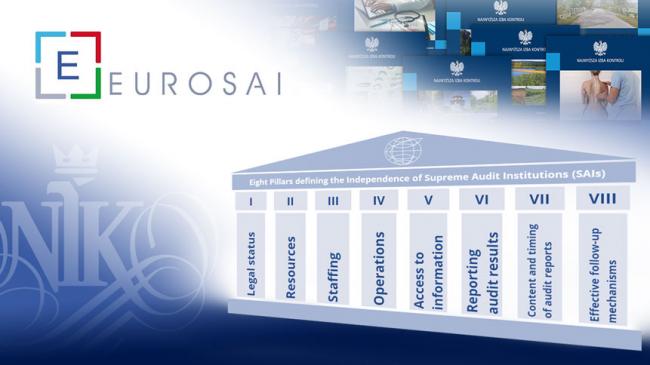Addressing the Heads of Supreme Audit Institutions being part of EUROSAI and European Union, NIK President Marian Banaś emphasised that as the author of the largest reform of tax services after 1990 he contributed among others to the tax base reconstruction in Poland. As a result the state budget was funded with about PLN 300 billion additional revenues, which allowed launching the programme “Family 500 plus”, being a real support of the state to families bringing up children. These days, however, Marian Banaś as the President of the Supreme Audit Office of Poland, became the object of interest of intelligence agencies. Interestingly enough, it was when NIK started to publish audit findings significant for the state functioning.
The Heads of 12 European SAIs participating in the online conference underlined the significance of independence of their institutions. President of the SAI of Moldova Marian Lupu indicated that solidarity among SAIs is vital to face attacks of the Executive. President of the Turkish SAI Seyit Ahmet Bas said that the situation becomes alarming when a SAI’s independence is being challenged. Vasyl Nevidomy from Ukraine asked INTOSAI and EUROSAI to support its members. President of the SAI of Slovakia Karol Mitrik in his letter to the President of NIK expressed his understanding of the situation in which Marian Banaś has found himself and assured NIK President of his support, if necessary. Einar Gørrissen Director General of the INTOSAI Development Initiative (IDI), organisation supporting SAIs worldwide noted that SIRAM - a special quick response mechanism for Supreme Audit Institutions could be applied in this case. This is a form of support and legal care in case a SAI’s independence is violated.
At the end of the conference, NIK President thanked for the solidarity, the unconditional support and emphasising that SAIs’ independence is crucial. He expressed hope that the SIRAM mechanism would not have to be used.
Independence underpins the activity of all Supreme Audit Institutions. Its maintenance and protection is one of primary principles promoted by INTOSAI all over the world. The independence principle was defined in the Lima Declaration in 1977. Another declaration, called the Mexico Declaration, was adopted 30 years later, in 2007, specified the independence in more detail. It isolated eight pillars of independence, as prerequisites for public finance auditing. Those principles were fostered many times by United Nations Organisation. The culmination was when two resolutions of the General Assembly were adopted in 2011 and 2014.
Eight pillars defining the independence of Supreme Audit Institutions (SAIs) are:
- Legal status
- Resources
- Staffing
- Operations
- Access to information
- Reporting audit results
- Content and timing of audit reports
- Effective follow-up mechanisms
The first, the third and the fifth pillars are among the most important ones. The first one says that the independence of SAIs needs to be clearly specified in the constitution and in legislation. The third pillar indicates that the independence of SAIs’ Heads may be guaranteed exclusively when they are nominated for a definite and long enough term of office and their removal is completely independent of the Executive. That is why, they can discharge their duties without fearing any sanctions. The fifth pillar determines that auditors should have free, on-going and unlimited access to all documents and information essential to perform their duties.
In 2017, the Global SAI Report (which evaluates SAIs’ activity, results and capacity every three years) published data showing challenges faced by SAIs. According to the report, 30% of SAIs could not obtain unlimited and free access to timely information, whereas 64% of SAIs reported an interference of the Executive in their budget process (41% in 2014).
On 17 May 2021, the assembly of the Heads of SAIs of the member states of the EU and the European Court of Auditors, so-called Contact Committee, noted that the Audit Office of the Republic of Cyprus has recently experienced significant difficulties in performing the audit of the investment programme of Cyprus. They were related in particular to restrictions concerning direct and free access in due time to all significant documents and information which the SAI considered essential for the needs of the audit and external attempts to influence its decisions concerning the publication of relevant reports. Therefore, the Contact Committee gave its support to the Audit Office of the Republic of Cyprus. In its statement, the SAI of Cyprus called to respect its constitutional role and not interfere in the way it executes its auditing rights. Besides, the President of NIK Marian Banaś sent a letter to the Auditor General of the Republic of Cyprus, where he expressed his full support for independent activities of the SAI of Cyprus.


